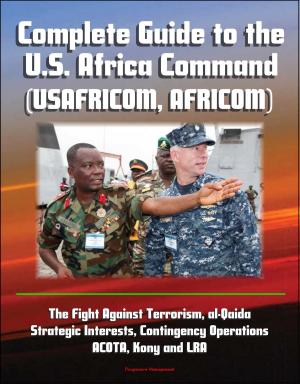The Rules of Defeat: The Impact of Aerial Rules of Engagement (ROE) on USAF Operations in North Vietnam, 1965-1968, Effect on Commanders and Aircrews, Rolling Thunder Bombing Mission Effectiveness
Nonfiction, History, Military, Vietnam War, Asian, Aviation| Author: | Progressive Management | ISBN: | 9781370512614 |
| Publisher: | Progressive Management | Publication: | September 27, 2016 |
| Imprint: | Smashwords Edition | Language: | English |
| Author: | Progressive Management |
| ISBN: | 9781370512614 |
| Publisher: | Progressive Management |
| Publication: | September 27, 2016 |
| Imprint: | Smashwords Edition |
| Language: | English |
This important report has been professionally converted for accurate flowing-text e-book format reproduction. During the Vietnam War, many American air commanders were convinced that rigid Rules of Engagement (ROEs) prevented an American aerial victory over North Vietnam during the Rolling Thunder air campaign from 1965-1968. ROEs were directives issued by civilian authority to guide the conduct of all US aerial operations in Southeast Asia. To the men "in the field" these rules provided detailed guidance to be followed by all commanders, air planners, control personnel, and combat crew members in the actual planning and flying of combat missions. ROEs allowed President Lyndon Johnson to apply measured amounts of air power both to avoid escalation of the war into World War III and to preserve domestic social programs. The belief among airmen that ROEs undermined Rolling Thunder was later strengthened by the 1972 Linebacker II air campaign and the more recent Desert storm air war. Both air campaigns were seemingly decisive, had few restrictive ROEs, and were conducted in a "straightforward" manner compared to the gradual approach of Rolling Thunder. A detailed examination of the ROEs from 1965-1968 reveals that they made the conduct of the air campaign terribly inefficient and also hampered its effectiveness; however, ROEs were not the sole cause of Rolling Thunder's failure.
This paper examines how these rules affected the effective military execution of the Rolling Thunder air campaign, as well as their impact on American aircrews and the enemy. ROEs violated United States Air Force doctrine and stood in stark contrast to accepted "principles of war." As a result, many vital military targets were either not bombed or were attacked in a very limited and piecemeal fashion. ROEs became so complicated and changed so often that aircrews found it difficult to know what the rules were from day to day. The rules forced aircrews to fly and fight in a manner contrary to training and doctrine. The rules also helped to create a rift between military and civilian leaders, and made what would have been very difficult missions under the best of circumstances a true nightmare. The ROEs further became a weapon for the enemy to use against America, allowing him time to prepare for air attacks and to develop a deadly air defense system, time to recover from much of the bombing damage, and sanctuaries free from air attacks which allowed the continued flow of imported war materials. The rules guaranteed one thing: the loss of many American men and aircraft. Few nations, if any, can hope to defeat the United States in conventional warfare. But in all probability, future wars will most likely be fought for limited objectives similar to those sought in Vietnam and in the Persian Gulf. These wars will likely be fought with fewer dollars, fewer aircraft, and fewer personnel than before. The United States cannot afford ROEs which act as a "Force Divider" instead of a "Force Multiplier." In future air campaigns, ROEs may very well be that key factor that determines victory or defeat.
This important report has been professionally converted for accurate flowing-text e-book format reproduction. During the Vietnam War, many American air commanders were convinced that rigid Rules of Engagement (ROEs) prevented an American aerial victory over North Vietnam during the Rolling Thunder air campaign from 1965-1968. ROEs were directives issued by civilian authority to guide the conduct of all US aerial operations in Southeast Asia. To the men "in the field" these rules provided detailed guidance to be followed by all commanders, air planners, control personnel, and combat crew members in the actual planning and flying of combat missions. ROEs allowed President Lyndon Johnson to apply measured amounts of air power both to avoid escalation of the war into World War III and to preserve domestic social programs. The belief among airmen that ROEs undermined Rolling Thunder was later strengthened by the 1972 Linebacker II air campaign and the more recent Desert storm air war. Both air campaigns were seemingly decisive, had few restrictive ROEs, and were conducted in a "straightforward" manner compared to the gradual approach of Rolling Thunder. A detailed examination of the ROEs from 1965-1968 reveals that they made the conduct of the air campaign terribly inefficient and also hampered its effectiveness; however, ROEs were not the sole cause of Rolling Thunder's failure.
This paper examines how these rules affected the effective military execution of the Rolling Thunder air campaign, as well as their impact on American aircrews and the enemy. ROEs violated United States Air Force doctrine and stood in stark contrast to accepted "principles of war." As a result, many vital military targets were either not bombed or were attacked in a very limited and piecemeal fashion. ROEs became so complicated and changed so often that aircrews found it difficult to know what the rules were from day to day. The rules forced aircrews to fly and fight in a manner contrary to training and doctrine. The rules also helped to create a rift between military and civilian leaders, and made what would have been very difficult missions under the best of circumstances a true nightmare. The ROEs further became a weapon for the enemy to use against America, allowing him time to prepare for air attacks and to develop a deadly air defense system, time to recover from much of the bombing damage, and sanctuaries free from air attacks which allowed the continued flow of imported war materials. The rules guaranteed one thing: the loss of many American men and aircraft. Few nations, if any, can hope to defeat the United States in conventional warfare. But in all probability, future wars will most likely be fought for limited objectives similar to those sought in Vietnam and in the Persian Gulf. These wars will likely be fought with fewer dollars, fewer aircraft, and fewer personnel than before. The United States cannot afford ROEs which act as a "Force Divider" instead of a "Force Multiplier." In future air campaigns, ROEs may very well be that key factor that determines victory or defeat.















